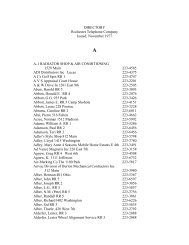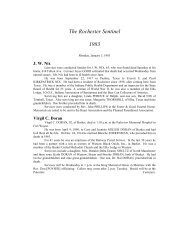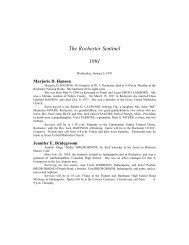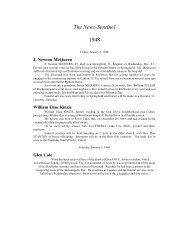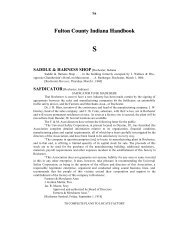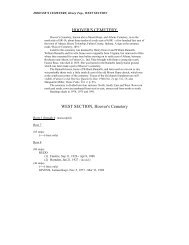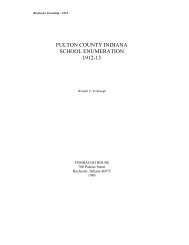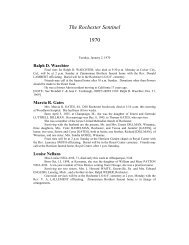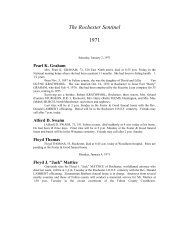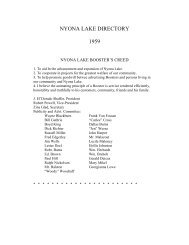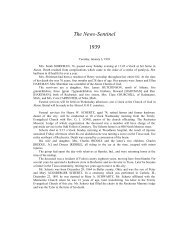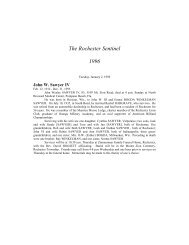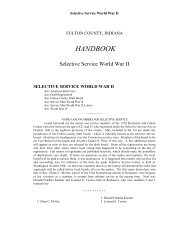Handbook N-P - Fulton County Public Library
Handbook N-P - Fulton County Public Library
Handbook N-P - Fulton County Public Library
Create successful ePaper yourself
Turn your PDF publications into a flip-book with our unique Google optimized e-Paper software.
Ov<br />
Having failed at operating the Richland Center general store and then escaping the<br />
drudgery of a South Bend factory, my late father Charles S. Overmyer decided in 1916 that<br />
Rochester best could supply the means to support his new wife and oncoming children.<br />
The memoirs he left behind, under discussion here today for a third and final week,<br />
reveal that his search for a means satisfactory to his pysche as well as to his pocketbook was not to<br />
be an easy one.<br />
He first concluded that painting girders at the Rochester Bridge Company factory, on the<br />
city's north edge, was unsatisfactory; “not much future in this.'”Nor was keeping books for Florian<br />
Dovichi's wholesale fruit business at 721 Main Street, site of today's Main Street tavern. Working<br />
indoors at Dovichi's affected his heart because "I got all the stale air from the store along with the<br />
odors from the fruit stored below.” Dr. Howard Shafer ordered him into fresh-air work.<br />
Writes my dad Charley, rather ruefully: “I think (in-laws) Minnie and Percy began to<br />
think that Edyth hadn't got such a steady husband but they never let on to me. Edyth used to say<br />
that Minnie would give her the devil about things I would do but she was always nice to me.”<br />
That should have a familiar ring to many husbands: it does to me.<br />
The Overmyers, now a threesome with daughter June's birth in 1916, got into fresh air by<br />
moving to the Richland Township. homestead. He rented the place from his father, who was<br />
having a hard time farming it with his four sons gone. To start out, Charley had only his last<br />
week's pay from Dovichi, "the great sum of $12," he recalls. The first year was a hard scrabble<br />
and he writes that "we would have had pretty slim eating if it hadn't been for Percy and Minnie<br />
who would come out over the weekend and always bring some meat and groceries." Dad<br />
persevered for a few years, built up the wornout soil and finally was farming all 160 acres with<br />
two three-horse teams, two riding plows and a hired man. But then, “Just when I felt like I was<br />
accomplishing something,” an abdominal injury forced him to leave the fields.<br />
The family came back to Rochester, where in 1924 son Jack arrived. Dad first drove a<br />
pickup route for cousin Cliff Overmyer's poultry business. But then he discovered electricity, an<br />
occupation that would possess him for 16 years. He was hired by the Northern Indiana Power<br />
Company (now Cinergy) that had bought out the Rochester electrical utility, was expanding<br />
service to outlying towns and needed workers. He began as a truck driver for construction gangs,<br />
learned to climb poles, do line work and after four years became line foreman.<br />
Dad always was proud oi his accomp lishments as foreman, as well he should have been.<br />
He was line boss for 12 years. sometimes directing 20 workers, and never had one of his men<br />
injured, or “burnt,” as he terms it. He built the lines into Ttosa, Talma, Lucerne, Tippecanoe. and<br />
Bourbon. Many were the nights that I was awakened by a telephone call summoning him to direct<br />
storm damage repair.<br />
My father was an ambitious man like his father and decided that he should have<br />
“something working for me on the side." So about 1933 he started a chicken hatchery in a former<br />
cigar factory next to our house at 212 East Sixth Street. "I worked in the hatchery in the evening<br />
and Edyth took care of it during the day." Soon afterward he put in a feed mill in the barn at the<br />
end of East Sixth Street, on land now occupied by Gaerte Engines.<br />
In 1935 his mother died and his father no longer was able to manage the family<br />
homestead, so Dad bought it, assuming the mortgage as well as making additional monthly<br />
payments to his father. Obviously, Dad had been managing his foreman's wages of $180 per<br />
month quite well; he now owned a chicken hatchery, feed mill and 160-acre farm.<br />
However, Northern Indiana Power officials were not happy with his outside interests.<br />
“They claimed that with my hatchery and feed mill I was competition to their customers." Dad<br />
always believed that the company wanted to sever him before his 20-year pension kicked in. His<br />
memoirs detail various job harassments that continued for so long that "they finally made me mad<br />
enough and I quit, and they were satisfied.”<br />
For practical purposes, that ended my father's employment by others and he became a<br />
much happier man for it. Our family made one more stab at living on the homestead, but there he<br />
developed a debilitating case of undulant fever and we came back to town. The disease is<br />
transmitted by infected farm animals and was little understood at the time. Dr. Dan Urschel of



